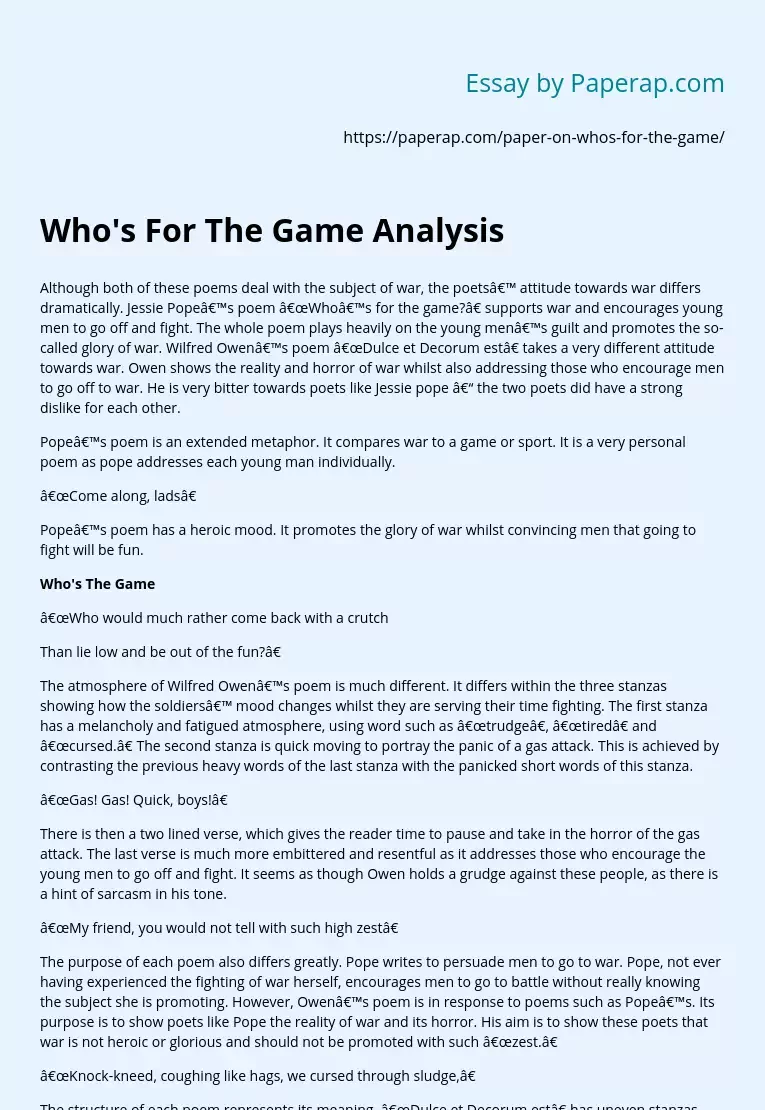Who's For The Game Analysis
Although both of these poems deal with the subject of war, the poets’ attitude towards war differs dramatically. Jessie Pope’s poem “Who’s for the game?” supports war and encourages young men to go off and fight. The whole poem plays heavily on the young men’s guilt and promotes the so-called glory of war. Wilfred Owen’s poem “Dulce et Decorum est” takes a very different attitude towards war. Owen shows the reality and horror of war whilst also addressing those who encourage men to go off to war.
He is very bitter towards poets like Jessie pope – the two poets did have a strong dislike for each other.
Pope’s poem is an extended metaphor. It compares war to a game or sport. It is a very personal poem as pope addresses each young man individually.
“Come along, lads”
Pope’s poem has a heroic mood. It promotes the glory of war whilst convincing men that going to fight will be fun.
Who’s The Game
“Who would much rather come back with a crutch
Than lie low and be out of the fun?”
The atmosphere of Wilfred Owen’s poem is much different. It differs within the three stanzas showing how the soldiers’ mood changes whilst they are serving their time fighting. The first stanza has a melancholy and fatigued atmosphere, using word such as “trudge”, “tired” and “cursed.” The second stanza is quick moving to portray the panic of a gas attack. This is achieved by contrasting the previous heavy words of the last stanza with the panicked short words of this stanza.
“Gas! Gas! Quick, boys!”
There is then a two lined verse, which gives the reader time to pause and take in the horror of the gas attack. The last verse is much more embittered and resentful as it addresses those who encourage the young men to go off and fight. It seems as though Owen holds a grudge against these people, as there is a hint of sarcasm in his tone.
“My friend, you would not tell with such high zest”
The purpose of each poem also differs greatly. Pope writes to persuade men to go to war. Pope, not ever having experienced the fighting of war herself, encourages men to go to battle without really knowing the subject she is promoting. However, Owen’s poem is in response to poems such as Pope’s. Its purpose is to show poets like Pope the reality of war and its horror. His aim is to show these poets that war is not heroic or glorious and should not be promoted with such “zest.”
“Knock-kneed, coughing like hags, we cursed through sludge,”
The structure of each poem represents its meaning. “Dulce et Decorum est” has uneven stanzas, reflecting the uncertainty of the situation the soldiers were put in. ie. Not knowing what would happen next. It has 4 stanzas, each varying in length as the poem progresses.
Pope’s poem, however is a much more regular, evenly structured poem. It has 4 stanzas like Owen’s poem but they are of equal length. This reflects the poem’s simplicity and perhaps ironically shows the poet’s naivety. It shows the lack of true understanding the poet has of war.
Both poems contain a regular ABAB rhyme pattern. However Owen’s poem has a slightly more complex rhyme pattern at the end of each stanza. This reflects the poem’s ominous atmosphere and the soldiers’ need for certainty amongst the uncertainty around them.
Again, there are differences between the two poems in imagery. “Who’s for the game?” does not have much imagery. It relates to a game throughout the poem but there is not much description of anything. The language used is colloquial to add a personal touch to the poem.
“Come along, lads”
At the end of the poem, Pope personifies the country and likens it to a girlfriend or wife to play on the guilt of the young men even more.
“Your country is up to her neck in a fight,
And she’s looking and calling for you.”
Wilfred Owen uses much more imagery in his poem. His describes in a fair amount of detail the aspects of war, such as the fatigue and the witnessing of a fellow soldier dying in a gas attack. In these descriptions, Owen uses different methods to emphasise the imagery, for example when he describes his friend being killed by the gas he uses a simile.
“And flound’ring like a man in fire or lime”
He also uses an extended metaphor of drowning when talking about the gas attack. He repeats the word drowning to give a dramatic effect.
In the fourth stanza, when he is describing the real aspects of war, Owen uses very onomatopoeic words such as “gargling” to emphasize the disgusting conditions he had to grow accustomed to.
“Of vile, incurable sores…”
The rhythm of each poems also differs whilst representing the meaning. “Who’s’ for the game?” has a rhythm like a child’s poem. It is simple but appealing to a cross-section of people from society. It makes the poem cheerful and easy to understand.
“Dulce et Decorum est” is much more complex. It is trochaic therefore making the rhythm less noticeable. It makes it sound much more like a piece of prose or natural speech.
Generally, these two poems have not much in common. They use different techniques to get their message across, have different moods and show two very different attitudes to war.
Who's For The Game Analysis. (2019, Dec 05). Retrieved from https://paperap.com/paper-on-whos-for-the-game/

